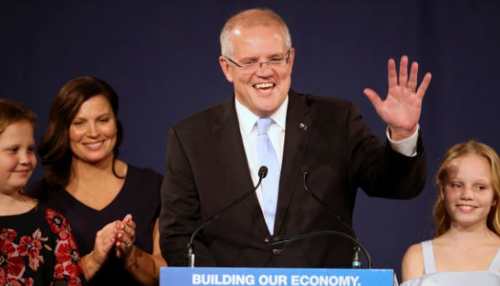- News>
- World
Australia PM struggles to meet tax relief election pledge, central bank urges stimulus

Reserve Bank of Australia Governor Philip Lowe said the main reason for a downward shift in economic momentum was a slowdown in household consumption.
SYDNEY: Australia`s re-elected coalition said on Tuesday it would struggle to deliver tax breaks for tens of millions of voters by July 1, a cornerstone of its election campaign, as the central bank called for stimulus to aid a slowing economy. Treasurer Josh Frydenberg said parliament may not convene in time to pass the tax legislation, promised for July 1, due to vote counting and checking of results from Saturday`s election.
"The legislation needs to be passed and it will be the first priority of business once the parliament resumes," he told reporters in the capital Canberra. "It is not likely that the parliament will resume before the end of June because we have to wait for the writs to be returned," he added. The central bank, which is considering its first interest rate cut since 2016 as soon as next month, said on Tuesday tax relief was needed to boost an economy hit by a slowdown in household consumption.
Reserve Bank of Australia Governor Philip Lowe said the main reason for a downward shift in economic momentum - growth braked to an annualised 0.8% in the December quarter - was a slowdown in household consumption. "Stronger growth in income will help, but the more important factor is some tax relief," Lowe said in a speech calling on the new government to play its part in boosting household incomes.
The Liberal National coalition put tax rebates to about 10 million middle- and low-income earners - worth up to A$1,080 ($746.28) per person - at the heart of its campaign. After a surprise victory on Saturday, Prime Minister Scott Morrison said counting and checking of votes was unlikely to be finished in time for parliament to convene before the end of the financial year on June 30, when rebates were set to be issued once Australians filed their tax returns.
As a result, the coalition said it was looking for alternatives to help an economy that probably grew in the March quarter by less than 2% on an annual basis, the lowest growth since the global financial crisis. Frydenberg said the tax rebates would be delivered before July 1, 2020, but he declined to be more specific on the timing.
OUTRIGHT MAJORITY
The central bank would have welcomed the fillip to consumer demand as it wrestles with whether to cut interest rates from already record lows.
The first-quarter growth numbers will be released on June 5, a day after the RBA holds its next policy meeting where a cut to interest rates is a live possibility. The RBA has left its benchmark rate at a record low 1.50% since August 2016.
If the tax breaks are delayed, maybe for months or even a full year, it would pile pressure on the government already facing criticism for possibly breaking an election promise.
Economists had estimated the tax breaks would inject about A$7.5 billion ($5.18 billion) into the economy over 2019/20, lessening the need for a reduction in interest rates. While delivering the tax rebates is a headache for Morrison, an outright majority will be a boost for his legislative agenda.
Morrison entered the election at the head of a minority government after a series of defections, but secured an outright majority win on Saturday. The Australian Electoral Commission said on Tuesday that Morrison`s coalition was ahead in three seats where counting was too close to call. Should the coalition keep its lead, it will control 78 seats.
While coalition supporters celebrated, some Australians were exploring their options for leaving the country. New Zealand`s Immigration Minister Greg Forsythe said 512 Australians on Sunday registered interest in obtaining a Kiwi visa, a jump of 2,560% from May 12.
